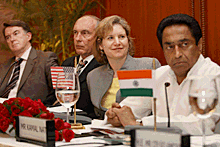
Typical street scene in Santa Ana, El Salvador. (Photo: iStock)
IMF Survey: IMF Presses on Doha Trade Agenda
May 23, 2007
- Trade seen as lynchpin of global growth
- Immediate focus on triangle of core issues
- Previously stalled talks have new impetus
The IMF is encouraging major players in the Doha Round of world trade negotiations to intensify work for what Managing Director Rodrigo de Rato has called a "once-in-a-generation" agreement.

Cars imported from China lined up in the Chilean port of Valparaiso (photo: Eliseo Fernandez/Reuters)
Renewed impetus at WTO
Pascal Lamy, head of the World Trade Organization, has warned that chances for a deal in the talks that have been going on for the past six years could slip away unless clear progress is made in the coming weeks.
"Trade has been the lynchpin of global growth since the Second World War," de Rato told a conference of the Council of Americas in Washington. "And the world is on the brink of a once-in-a-generation agreement that could expand opportunities even further. But if the chance is not taken, both prospects for future gains and the achievements of the past may be threatened by a rising tide of protectionism."
De Rato's May 2 speech was part of a series of pleas by the heads of several international organizations pressing for a concerted effort to reach a conclusion to the drawn-out talks that aim to liberalize global trade by cutting industrial and agricultural tariffs, and by reducing farm subsidies, with a special focus on achieving concrete benefits for developing countries. Finance ministers meeting in Potsdam, Germany on May 19 to prepare for the June 6-8 summit of leaders from the United States, Japan, Germany, Britain, France, Italy, Canada, and Russia called for agreement on core issues as soon as possible.
UN Secretary General Ban Ki-moon warned on April 23 that developing nations will suffer if the talks do not succeed. "Should this round of trade talks fail, serious damage will be done to those who can least afford it," he said in Qatar at the start of a conference on development, democracy, and free trade.

(from left) EU Trade Commissioner Peter Mandelson, Australian Trade Minister Warren Truss, U.S. Trade Representative Susan Schwab, Indian Trade Minister Kamal Nath at April 2007 meeting in New Delhi, India, to push Doha Round (photo: Raveendran/AFP)
Six leading trade players—Australia, Brazil, the European Union, India, Japan, and the United States—vowed in April at a meeting in India to speed up efforts to conclude the Doha Round, aimed at lifting millions out of poverty, and said they wanted a deal by the end of the year. According to Lamy, key to success is concessions by a "magic triangle" of countries—with the EU showing movement on agricultural tariffs, the U.S. on agricultural subsidies, and countries such as Brazil, Egypt, and India being ready to cut high tariffs on certain industrial goods.
A critical element in continued negotiations in approval by the U.S. Congress of an extension of the U.S. administration's Trade Promotion Authority (or "fast track" negotiating authority)—at least with regard to the Doha Round. Fast-track authority, which authorizes the U.S. administration to negotiate trade deals that Congress must approve or reject without any changes, expires at the end of June.
"Key players seem to be showing greater flexibility, but high-level political support is needed to resolve key sticking points relating to farm tariffs, domestic farm subsidies, and industrial tariffs."
Lamy briefed delegates at the Spring Meetings of the IMF and the World Bank in Washington in April about progress in the trade talks. So far, he said, there had been no breakthrough in the talks. "If the situation does not change soon," Lamy commented, "governments will be forced to confront the unpleasant reality of failure. Failure to lock-in the very significant package of trade liberalization and rule-making that is available. Failure to deliver on the core development objectives of this negotiation. Failure of the first WTO trade round, and of one of the most important exercises in multilateral economic cooperation of the past decade."
But Lamy said that success was within reach. "The challenge is less technical, than political," he stated. "It is about leadership, about compromise, about countries recognizing their common interest in success and the collective costs of failure. As in other rounds, U.S.-EU leadership is indispensable. Unlike previous rounds, leadership from key emerging players and ownership by developing countries is now just as important."
During the Spring Meetings, the IMF's International Monetary and Financial Committee (IMFC) called on the institution's 185 member governments to "work with a renewed commitment to urgently achieve an ambitious outcome."
It emphasized that "all members stand to benefit from a Doha Development Round outcome that promotes growth and fosters economic development by reducing trade barriers and strengthening the multilateral trade system. The committee considers it critically important to ensure that the benefits of globalization are widely shared and help reduce poverty and income disparities."
U.S. Trade Representative Susan Schwab said on May 1 that discussions were picking up pace. In New Delhi last month, Schwab and trade chiefs from the European Union, India, Brazil, Australia, and Japan said they believed that through harder work, "we can reach convergence and thus contribute to concluding the round by the end of 2007."
What are the sticking points?
Following the resumption of the Doha Round negotiations in January, key players seem to be showing greater flexibility, but high-level political support is needed to resolve key sticking points relating to farm tariffs, domestic farm subsidies, and industrial tariffs. Negotiations on tradeoffs in services have lagged behind other areas.
• Farm tariffs. The main issue is the depth of tariff cuts and the extent of exceptions, with the European Union, in particular, showing resistance to deeper cuts. New Zealand's ambassador to the WTO, Crawford Falconer, the chairman of the farm trade talks, has recently circulated revised suggestions for negotiation.
• Domestic farm subsidies. Discussions focus on the depth of subsidy reduction and on how various farm support regimes are classified. Negotiating partners have asked the United States to limit annual spending under qualified farm programs to $15 billion (requiring some cuts from current levels). At the WTO's high-level cotton conference in March, African cotton producers reiterated their call for a new aid mechanism to compensate for the adverse effects of cotton subsidies (see story on aid for trade).
• Industrial tariffs. Developed countries are pressing for sharper cuts in higher tariffs, but some emerging markets, especially Brazil and India, want to be able to retain higher tariffs. Other issues include non-tariff barriers, the treatment of tariffs not "bound" or limited in previous trade rounds, and sectoral initiatives.
• Services. Developed countries are also pressing for liberalization of services trade. Developing countries are generally resisting such liberalization, although some, including India, are pressing for greater access to developed country services markets through temporary migration.
While the immediate focus is on coming to agreement on the core "triangle" of issues, a successful conclusion to the Doha Round will also depend on the outcome of negotiations in several other fields, including services, such as insurance, banking and other sectors. Developed countries want negotiations on services to proceed independently from other areas, but developing countries have insisted on links with agriculture and nonagricultural market access (industrial tariffs).
Reaching a Doha Round conclusion that achieves ambitious multilateral trade reform and further strengthens multilateral rules so as to reduce the risks of protectionism would provide an important boost to the global outlook. But, as the IMF's April World Economic Outlook underlines, prospects for a sustained global expansion and a gradual unwinding of global imbalances would also benefit from initiatives, including through trade reform, to remove obstacles to the smooth reallocation of resources in response to exchange rate movements.


